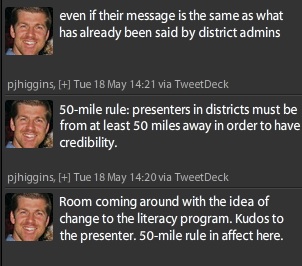The Detached Mouse Ear v. The Attached Mouse Ear

Tools and ideas to transform education. Sign up below.
You are now subscribed
Your newsletter sign-up was successful
Today I spun a phrase that I blatantly stole from someone, but at the time could not remember who that was. Upon further review, I stole it from Amy Sandvold.
Amy, here is your attribution (not that she asked for it by any means, but I felt giving credit to the source was the proper measure to take).
We are moving our middle school into the world of balanced literacy for the second time. We tried a few years back, and for the most part were successful in moving towards it. However, in light of some great work our elementary teachers have been doing using the Good Habits, Great Readers program, we felt that using some elements of that program, coupled with some of the elements we have cobbled from Fountas and Pinnell, would really move the needle, so to speak.
To accomplish this, we've pulled together all of our middle school language arts and Connections teachers for two days to work with a representative from Pearson whom we have used before and truly respect. However, listening to her speak to the teachers, and listening to their reactions to some of the things she is saying made me remember this phrase, which I broadcast out:

In many ways, what our presenter was saying was not wholly different from conversations we had engaged in previously in department meetings, other smaller workshops, and in one-on-one discussions with teachers. However, she had geography on her side.
And this is where Amy's quote sprang up for me.
Last year at ASCD, I sat in a session that was a panel discussion of literacy and literacy coaching in schools, and I wrote about it here and here at length. Amy discussed the idea that we had to take advantage of "prophets in our own land" (to steal one from @bethstill) but rather there was a mileage component that determined expertise. That component, she judged, was roughly fifty miles. To boot, she added these great illustrations of her concept:
Tools and ideas to transform education. Sign up below.

In this one, Amy was detailing how when the presenter is not from the district there is a greater instance of their perceived credibility, but what we should be moving towards is something I believe she called the "one-eared Mickey Mouse."

Okay, I might have made that last part up, but in looking at these images, observing the teachers and presenter today, and from my own experiences in districts or at conference as a presenter, I see Amy's theory as having some definite credence. Why is it that anyone with a great idea from within a district is not taken as seriously as someone who comes in for a day or two and makes the same claims? My all time favorite instance of this was when a teacher in my district was taking the requisite educational technology class for their doctoral program and one of the required readings for the first week was a post I wrote about the need for informed leaders who were models of technological literacy. I had to chuckle a little (and celebrate on the inside).
Don't get me wrong here--I enjoy working with districts and I think some great changes have come about individually within some of the people I have spoken to, but I don't understand why we can't celebrate the expertise that exists within our walls. Or, better yet, we can create sustainable professional development models that require multiple investigations into the concepts that are introduced by a one-time speaker. It's those systems I feel are more lacking when it comes to our professional development of teachers.
Cross-posted at Chalkdust101.
